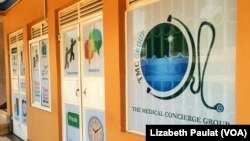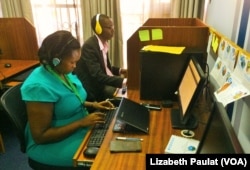Uganda has just one doctor for every 25,000 people, and health care can be particularly hard to access in rural areas; but, a medical hotline is bridging the gap, using social media to allow Ugandans to talk directly with certified doctors and pharmacists.
The phones don’t actually ring that much at the office of the Medical Concierge Group in Kampala.
People primarily contact them via What’s App and other messaging platforms. Using social media keeps overhead down and allows the group to offer the 24-hour hotline service for free.
Dr. Yvette Wibabara, who works at the call center, said that questions often reflect local health outreach initiatives.
“Certain seasons they publicize about health topics, menstruation, immunization," said Wibabara. "So depending on what's going on with the UNICEF publications that's what they get here most. The other platform we have is incoming and outgoing calls. Here we go."
The man on the phone has a question about his wife. He’s worried she’s suffering from a post-childbirth complication.
The hotline gets about 50,000 questions a month.
They also bring in specialists. When VOA visited their office, a Ugandan cancer specialist was doing an hour-long “tweet-up” taking and answering questions on Twitter.
Workers at the center said they spend a lot of time correcting common health myths, such as that vaccinations are dangerous, or that contraception causes long-term damage to women.
Dr. John Mark Bwanika said the platform also helps people who are too embarrassed to broach traditionally taboo subjects with their local health care provider.
“The questions are quite varied and straight out; but, a lot of the questions, especially from the young people, are on sexual reproductive health issues," he said. "Things like how do I use a condom? Where do I get testing for HIV? Where do I get post-abortion care? Or if I want to do abortion, what kind of services are available? What kind of services are not available? Things like emergency contraception, my condom broke during sexual intercourse or we just didn't use any form of protection, but I want to get services.”
Bwanika said many also call in to find out where their nearest care provider is located, as the Health Concierge Group keeps records of doctors and specialists around the country.
The group hopes to expand its service, not just here in Uganda, but throughout the region.







